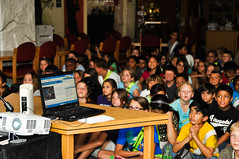Using technology to enhance feedback
University of Roehampton, Tuesday 14 December
As most of you will be aware feedback to students is very much in the spotlight, with most institutions keen to raise their score in the National Student Survey. This event will explore the use of different digital media for enhancing feedback and feed-forward provision to students. During the course of the day you will have opportunities to see how different technologies can help to enhance your feedback provision through:
· a range of case studies;
· hands-on media sessions;
· feedback design activities;
· discussion sessions;
· and networking opportunities.
The day is co-hosted by the successful ASSET project whose aim was to develop an innovative, interactive Web 2.0 resource, 'ASSET', to encourage staff to experiment with the use of video media to provide feed-forward and feedback to students on their assignments.
Provisional programme and further details available at: www.bioscience.heacademy.ac.uk/events/roehampton141210.aspx If you are unable to join us on the day and would like to follow the event virtually, please follow with the #heabio #fdback tags on twitter.
Please contact me (s.a.meskin@leeds.ac.uk) if you require any further details.
We look forward to possibly seeing you in December.
Sheryl Meskin, Ph.D.
Academic Advisor
UK Centre for Bioscience
The Higher Education Academy
Room 9.15, Worsley Building
University of Leeds
Leeds LS2 9JT
Tel: +44 (0)113 343 3438
Fax: +44 (0)113 343 5894
E-mail: s.a.meskin@leeds.ac.uk
(0.6 FTE Office Days - Tuesday, Wednesday, Thursday, Friday)

